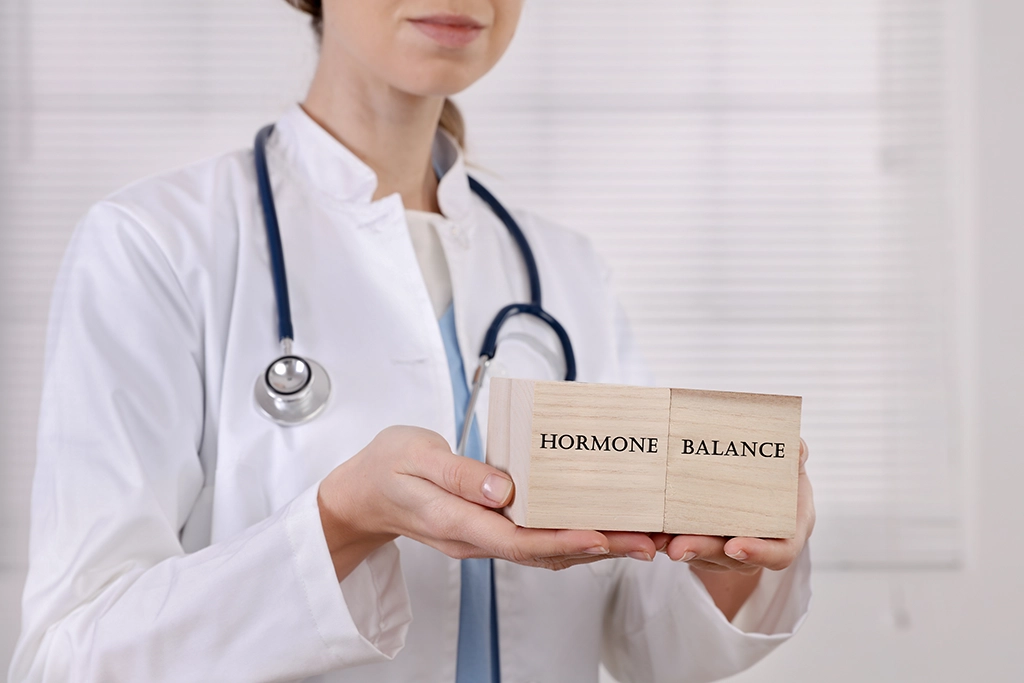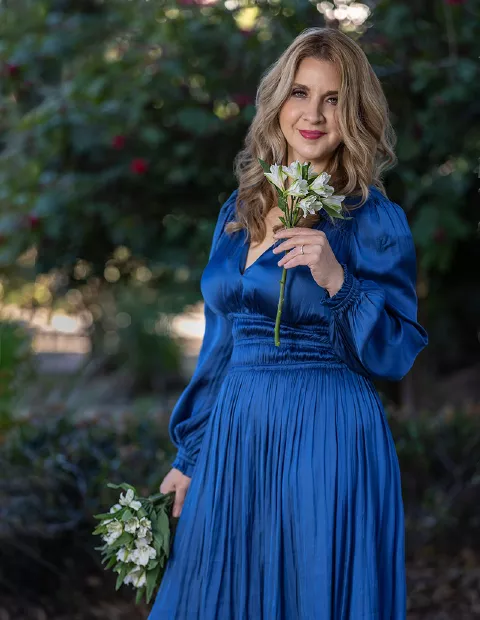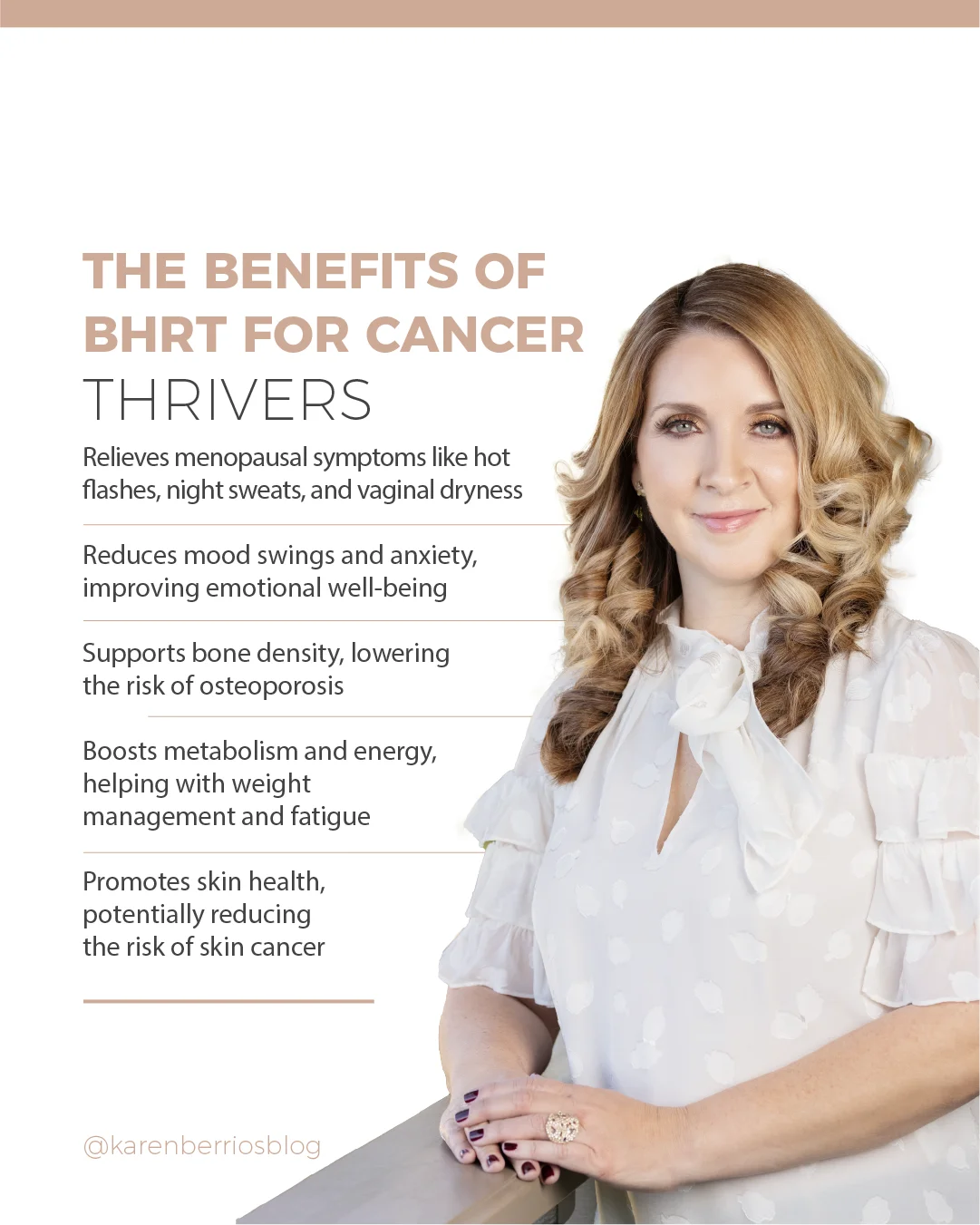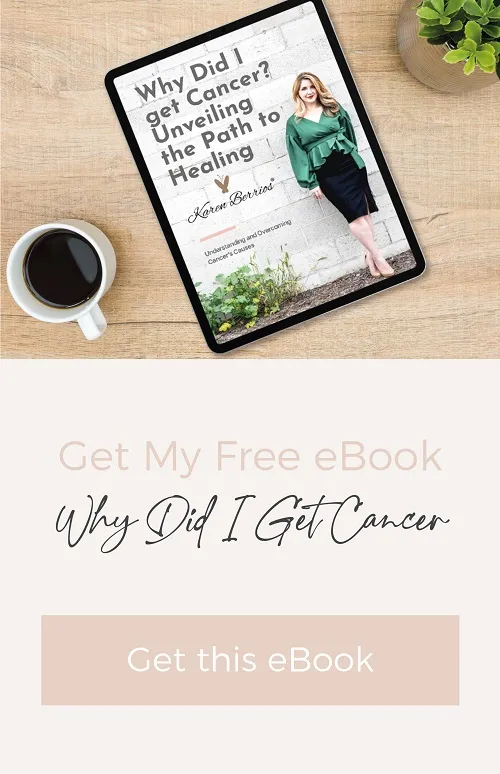

Is BHRT Safe for Cancer Survivors?
Not long ago, I found myself navigating the world of hormonal imbalances long after my thyroid cancer diagnosis. Like many cancer thrivers, I expected to focus on recovery, but just as I began to feel balanced and thriving, unanticipated menopausal symptoms came, hitting me with —hot flashes, mood swings, fatigue, and unexpected weight gain. These changes disrupted my quality of life, making me feel disconnected and once again facing challenges with my health that I honestly didn’t see coming. And boy oh boy these symptoms are tough!
When my doctor first suggested Bioidentical Hormone Replacement Therapy (BHRT), I was hesitant. Could introducing hormones into my body after cancer be safe? Could it cause cancerous cells to grow or even make cancer spread? These questions led me on a deep dive into research, expert opinions, and personal experience. If you’re a cancer survivor wondering whether BHRT is safe, let’s explore the science, benefits, and risks together.
What Does Research Say About BHRT for Cancer Survivors?
Bioidentical Hormone Replacement Therapy (BHRT) is often marketed as a “natural” alternative to conventional hormone replacement therapy (HRT). Unlike synthetic hormones, compounded bioidentical hormones are designed to mimic the exact molecular structure of the hormones produced by the human body. They come in different forms, including pills, creams, and patches, often customized by compounding pharmacies.
A study published in Maturitas suggests that using transdermal estradiol along with micronized progesterone or dydrogesterone could help lower the risk of blood clots associated with oral estrogens and the likelihood of breast cancer linked to synthetic progestins. The research highlights the importance of personalized treatment, ensuring that each woman receives the most suitable approach based on current evidence, with ongoing evaluations to balance benefits and risks effectively.
The Benefits of BHRT for Cancer Thrivers
Many cancer thrivers experience hormonal imbalances due to cancer treatments, surgeries, or the removal of hormone-producing glands. The side effects of these changes can be overwhelming, impacting both physical and mental health.
BHRT has been shown to help with:
- Menopausal symptoms, including hot flashes, night sweats, and vaginal dryness
- Mood swings and anxiety, promoting emotional well-being
- Bone density, reducing the risk of osteoporosis
- Metabolism and energy levels, addressing weight gain and fatigue
- Skin health, potentially lowering the risk of skin cancer related to aging
Many patients report that compounded bioidentical hormones feel more natural than synthetic alternatives, leading to better absorption and fewer unwanted side effects.
Potential Risks: Can BHRT Cause Cancer to Return?
Concerns about the safety of Bioidentical Hormone Replacement Therapy (BHRT) stem largely from past misconceptions about hormone replacement therapy (HRT) in general. Much of the fear surrounding hormone therapy originated in 2002 with the Women’s Health Initiative (WHI) study, which suggested an increased risk of breast cancer in women using synthetic hormone therapy like Prempro®. However, later reviews exposed major flaws in the study design, revealing that the reported risk increase was statistically insignificant. Despite this, the misleading findings sparked worldwide panic, causing millions of women to abandon hormone therapy and many doctors to stop prescribing it altogether.
Subsequent research has differentiated bioidentical hormones from synthetic ones, showing that compounded bioidentical hormones (cBHRT), which mimic the body’s natural hormones, may have a lower risk profile. Experts like Dr. Avrum Bluming have even suggested that, for properly treated breast cancer survivors, hormone therapy may not increase recurrence risk.
While some oncologists remain cautious, others argue that hormones do not cause cancer but rather influence existing cancerous cells. This highlights the need for personalized treatment, where hormone levels are carefully monitored to ensure safety. Understanding individual risk factors, medical history, and ongoing research is crucial in making an informed decision about BHRT.
My Personal Journey with BHRT After Thyroid Cancer
After my thyroid cancer diagnosis and treatment, I struggled with severe menopausal symptoms. My hormone levels were all over the place, and I felt like my body was betraying me. Hot flashes, brain fog, weight gain, and chronic fatigue made everyday tasks feel overwhelming.
At first, I was terrified of hormone replacement therapy (BHRT). Could it increase my risk of another cancer diagnosis? But after months of research, multiple consultations, and thorough hormone level testing, I made the decision to try a carefully monitored BHRT plan.
For me, BHRT was life-changing. Within weeks, my energy levels improved, my mood swings stabilized, and I felt like myself again. I continued working closely with my doctors to ensure safe hormone levels, and through regular monitoring, I found a balance that supported my quality of life without compromising my health.
I still get my hormone levels checked regularly, and I remain cautious about dosage but I no longer live in fear of my hormones working against me. BHRT helped me feel like my old self was back!
Expert Recommendations: Is BHRT Safe for You?
If you’re considering BHRT, here’s what experts recommend:
1. Work with an Experienced Doctor
Not all doctors specialize in hormone replacement therapy (BHRT). Seek out an endocrinologist or oncologist who understands BHRT for cancer survivors. Furthermore, make sure your medical practitioner has the experience and/or certifications on BHRT from a reputable organization such as BHRT Academy or A4M.
2. Get Your Hormone Levels Tested
Comprehensive hormone testing before starting BHRT is crucial. Regular monitoring helps avoid excess estrogen and progesterone that could stimulate tumor growth. Here are a couple labs I believe are terrific for this ZRT Labs and Dutch test.
3. Explore Non-Hormonal Alternatives
If you’re unsure about BHRT safety, there are non-hormonal options for managing menopausal symptoms, such as:
-
- Lifestyle changes, including diet, exercise, and stress management
- Herbal supplements, but always consult a doctor before using them
- Non-hormonal medications for hot flashes and mood swings
- Wellness Centers such as Agape Healing Arts can help with a personalized herbal protocol.
4. Make an Informed Decision
Every cancer survivor’s journey is unique. BHRT safety depends on multiple factors, including cancer type, treatment history, and personal health goals.
Final Thoughts: Should Cancer Survivors Use BHRT?
So, is BHRT safe for cancer survivors? The answer is not one-size-fits-all. While research suggests that BHRT may be safe with careful monitoring, the risks depend on individual health history.
For me, BHRT was the right choice, but I made that decision with knowledge, research, and medical supervision. If you’re considering bioidentical hormone replacement therapy, I encourage you to educate yourself, consult trusted professionals, and find a plan that aligns with your health needs.
Your health is worth fighting for.
Have you considered BHRT as a cancer survivor? Let’s discuss your experiences and thoughts in the comments.

hey there
I'm Karen!
I have found my cancer journey to be a positive and profound transformational experience. I’m inspired to share my healing journey here, and trust you’ll find hope, encouragement and purpose as you discover the healing power that lies within you.
Join
The Mailing List!
By signing up for my newsletter, you agree with our Privacy Policy and Terms & Conditions.



